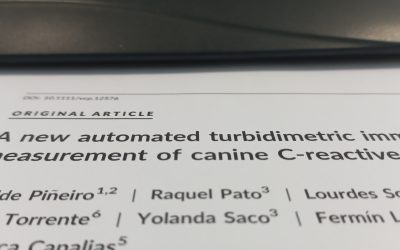Acuvet ELISA
ELISA test for measuring acute phase proteins.
Turbovet
Inmunoturbidimétric test for clinical chemistry analyzers.
Consultancy and analytical service
We help you to use our biomarkers.

Welcome to Acuvet Biotech
Early detection of disease and identification of the presence of stress in animals is crucial to their well-being. At Acuvet Biotech, we specialize in biomarker analysis for animal health and welfare. In particular, we focus on the detection of acute-phase proteins, which are known to be early indicators of the presence of disease or stress. We aim to improve animal care by providing reliable analytical tools, supported by a wealth of technical and scientific knowledge.
Ensure animal welfare
Definitively evaluate the state of the animal through biomarker analysis, using simple and objective measurement.
Better care
Detecting hidden problems facilitates fast and appropriate initiation of treatment, ensuring the best prognosis. Biomarkers provides confirmation of treatment efficacy, as their levels return to baseline if animal recovers.
Improve productivity
Improving animal welfare contributes to increased productivity and higher quality products on farms.
Acute Phase Proteins
Disease, injury, and stress are associated with increased blood levels of acute-phase proteins; thus, these proteins are valuable biomarkers for evaluating animal health and welfare.
How we can help you
Do you need a reliable, species-specific, well-validated test to be confident in your analytical results?
Do you want to use our biomarkers in a study and need advice?
Would you like to have an objective measure of animal health and welfare?
Do you want to monitor the state of animal health and well-being on the farm?
Trust the specialist, trust Acuvet. Discover how we can help you.
Our sections

Livestock farming
Improve control of on-farm animal health, welfare, and productivity.

Research
Our experts have a wealth of technical and scientific knowledge to support you in your studies.

Laboratory
Test with confidence: species-specific and well validated test. Discover the advantages of our test and all that Acuvet has to offer.

Veterinary clinics and hospitals
Reliable tests for a safe diagnosis. Discover our test for canine C-reactive protein.
Featured news
Acuvet Biotech at the 31 Word Buiatrics Congress
Acuvet Biotech will participate in the World Buitric Congress, where we will be presenting an oral communication and a poster. tAfter two years of waiting due to the pandemic, the 31 World Buiatrics Congress can finally be held in person, in Madrid, from 4-8 September...
New scientific publication
A new automated turbidimetric immunoassay for the measurement of canine C-reactive protein. This paper published in Veterinary Clinical Pathology shows the validation of Turbovet canine CRP, our test for measuring C-reactive protein in dog serum. The objective of the...
Acuvet Biotech at the II Conference on health management and animal welfare on animal shelters
Acuvet Biotech was invited to give a presentation on the II Conference on health management and animal welfare on animal shelters and animal collections. On November 25, the II Conference on Animal Management in animal shelters and Animal Residences organized by AVEM...
Want to know more? Contact us
Acuvet Biotech
Contact us
(+34) 976 731 533
info@acuvetbiotech.com
Location
C/ Bari, 25 duplicado
50197 Zaragoza (SPAIN)
© Acuvet Biotech - 2021 | Developed by o10media | Privacy Policy



